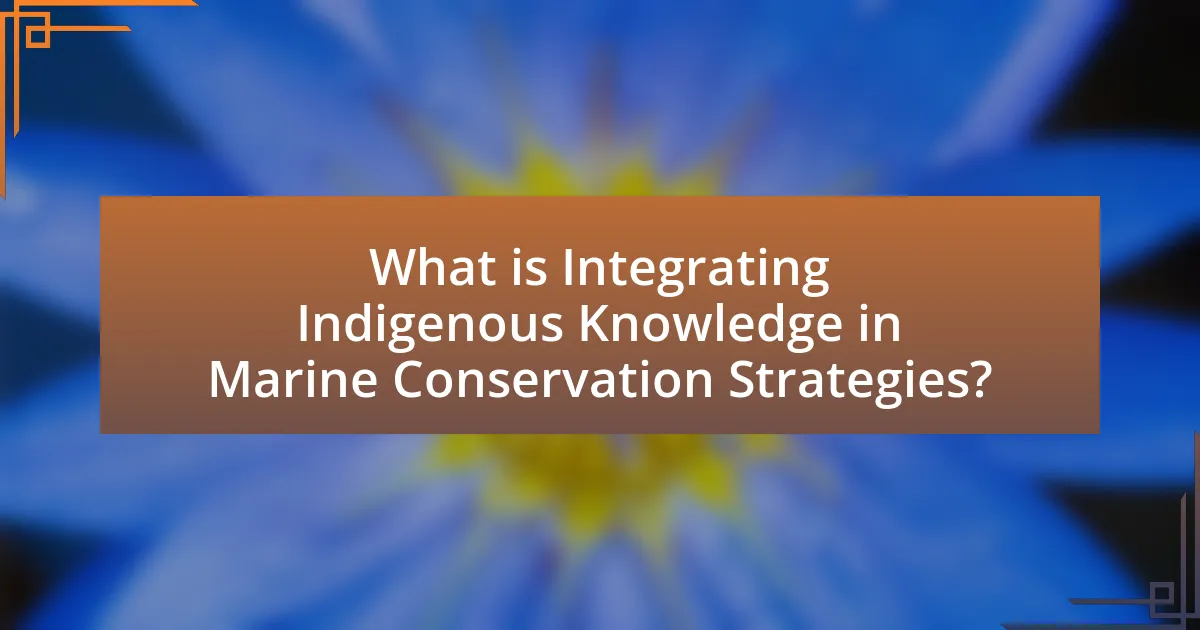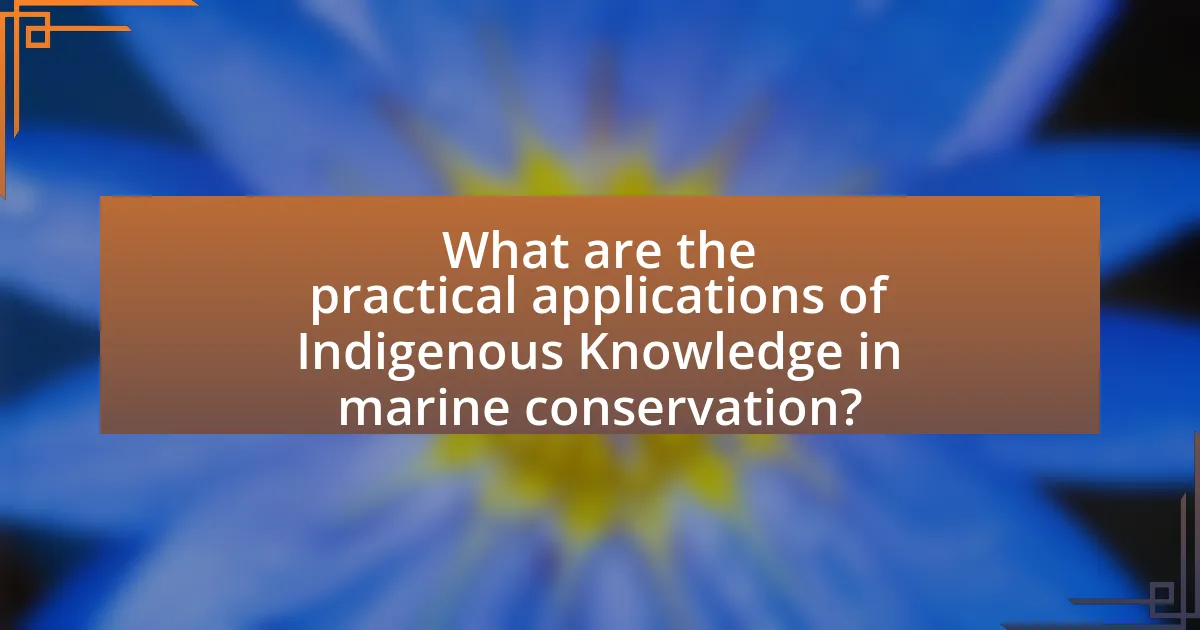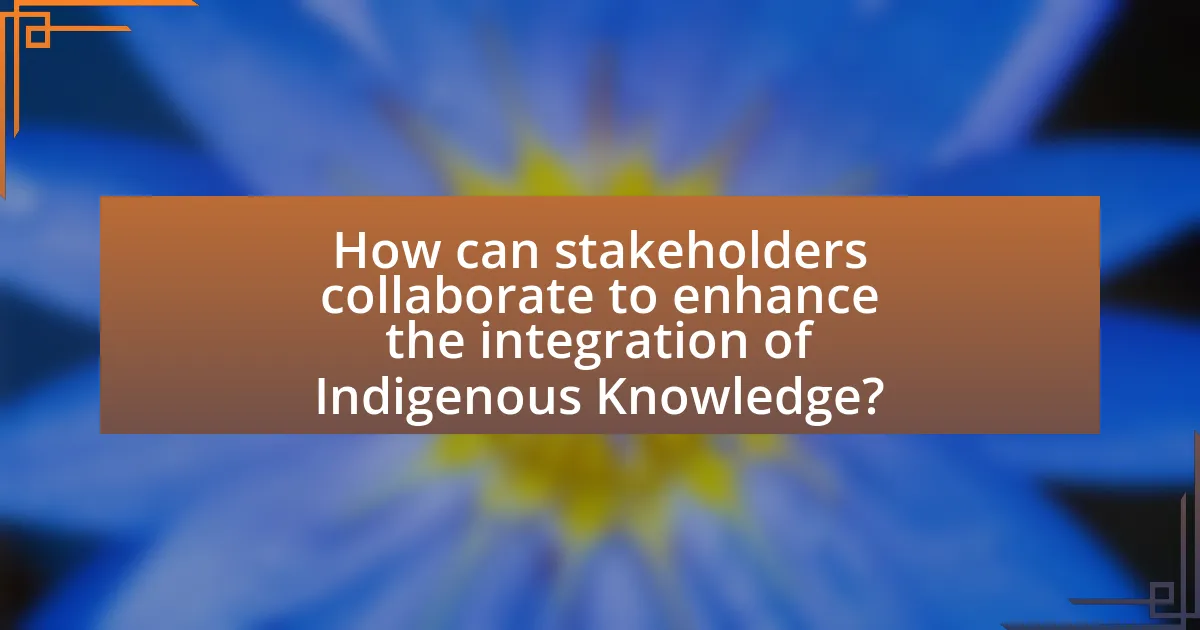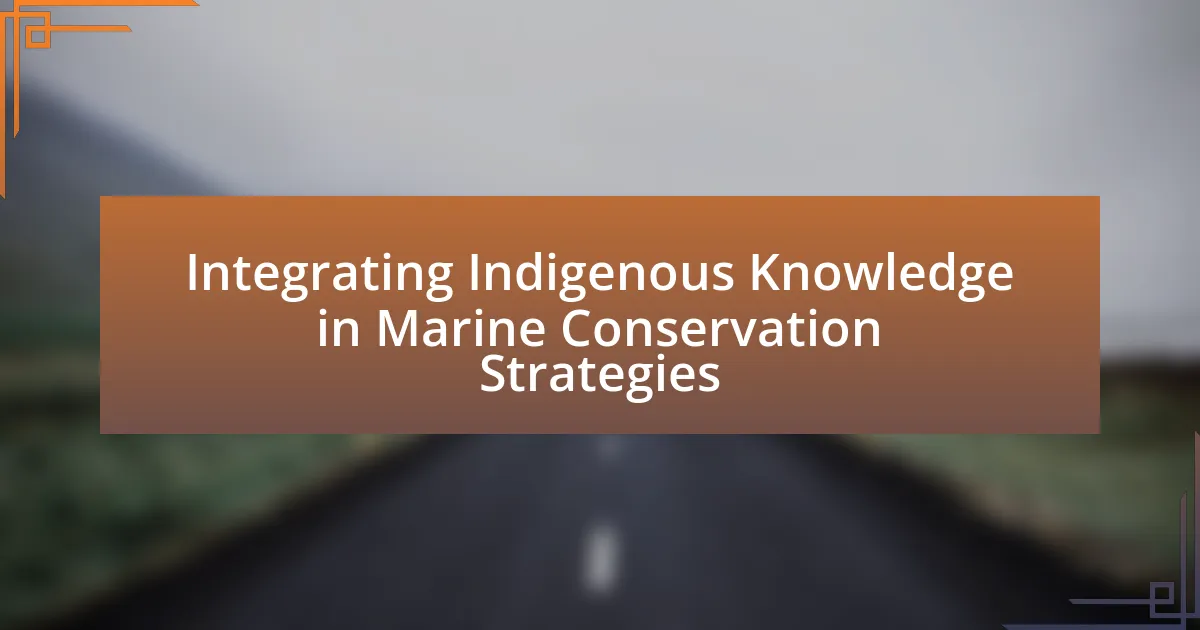Integrating Indigenous Knowledge in Marine Conservation Strategies focuses on the incorporation of traditional ecological knowledge from Indigenous communities into marine management practices. This approach enhances biodiversity conservation and ecosystem resilience by utilizing sustainable practices developed over generations. The article discusses the contributions of Indigenous Knowledge to marine conservation, key principles guiding its integration, and the differences between Indigenous and scientific methodologies. It also addresses the challenges faced in collaboration between Indigenous communities and conservationists, highlights successful case studies, and outlines practical steps for effective integration, emphasizing the importance of mutual respect and shared decision-making in achieving successful conservation outcomes.

What is Integrating Indigenous Knowledge in Marine Conservation Strategies?
Integrating Indigenous Knowledge in Marine Conservation Strategies involves incorporating traditional ecological knowledge and practices of Indigenous communities into marine management and conservation efforts. This integration recognizes the value of Indigenous perspectives, which often include sustainable practices developed over generations, and can enhance biodiversity conservation and ecosystem resilience. For instance, studies have shown that Indigenous-managed marine areas often exhibit higher levels of biodiversity compared to areas managed solely by conventional methods, highlighting the effectiveness of these traditional practices in maintaining healthy marine ecosystems.
How does Indigenous Knowledge contribute to marine conservation?
Indigenous Knowledge contributes to marine conservation by providing a deep understanding of local ecosystems and sustainable practices developed over generations. This knowledge encompasses traditional ecological practices, species behavior, and seasonal changes, which are crucial for effective management of marine resources. For instance, Indigenous communities often utilize practices such as rotational fishing and habitat protection, which have been shown to enhance biodiversity and resilience in marine environments. Research indicates that areas managed with Indigenous stewardship demonstrate higher fish populations and healthier ecosystems compared to those without such management. This evidence underscores the importance of integrating Indigenous Knowledge into contemporary marine conservation strategies for improved ecological outcomes.
What are the key principles of Indigenous Knowledge in this context?
The key principles of Indigenous Knowledge in the context of integrating it into marine conservation strategies include holistic understanding, sustainability, and community involvement. Holistic understanding emphasizes the interconnectedness of ecosystems, recognizing that marine environments are part of broader ecological and cultural systems. Sustainability focuses on practices that ensure the long-term health of marine resources, often guided by traditional ecological knowledge that has been passed down through generations. Community involvement highlights the importance of engaging local Indigenous communities in decision-making processes, ensuring that their perspectives and practices are respected and incorporated into conservation efforts. These principles are supported by numerous case studies demonstrating the effectiveness of Indigenous practices in maintaining biodiversity and ecosystem health, such as the successful management of fisheries in various Indigenous territories.
How does Indigenous Knowledge differ from scientific approaches?
Indigenous Knowledge differs from scientific approaches primarily in its foundation and methodology. Indigenous Knowledge is rooted in the cultural, spiritual, and historical experiences of Indigenous peoples, emphasizing a holistic understanding of the environment and its interconnectedness. In contrast, scientific approaches rely on empirical evidence, experimentation, and the scientific method, focusing on quantifiable data and reproducibility.
For example, Indigenous Knowledge often incorporates traditional ecological practices passed down through generations, which may include sustainable fishing techniques that have been effective for centuries. Scientific approaches, however, may prioritize short-term data collection and analysis, potentially overlooking the long-term ecological wisdom embedded in Indigenous practices. This distinction highlights the complementary nature of both knowledge systems in addressing environmental challenges, such as marine conservation.
Why is integrating Indigenous Knowledge important for marine ecosystems?
Integrating Indigenous Knowledge is important for marine ecosystems because it provides valuable insights into sustainable practices and ecological balance. Indigenous communities have a deep understanding of local marine environments, developed over generations, which includes knowledge of species behavior, seasonal changes, and ecosystem interdependencies. This knowledge can enhance conservation strategies by incorporating traditional ecological practices that have proven effective in maintaining biodiversity and resilience. For instance, studies have shown that Indigenous-managed areas often exhibit higher biodiversity and healthier ecosystems compared to those managed solely by conventional methods.
What unique insights does Indigenous Knowledge provide about marine biodiversity?
Indigenous Knowledge offers unique insights into marine biodiversity by emphasizing the interconnectedness of ecosystems and the importance of traditional ecological practices. This knowledge, developed over generations, includes detailed observations of species behavior, migration patterns, and the impacts of environmental changes, which are often overlooked by conventional scientific methods. For example, Indigenous communities have documented the seasonal availability of marine resources, which can inform sustainable fishing practices and conservation efforts. Studies, such as those by the United Nations Educational, Scientific and Cultural Organization (UNESCO), highlight how Indigenous Knowledge contributes to biodiversity conservation by promoting practices that enhance ecosystem resilience and sustainability.
How can Indigenous practices enhance conservation efforts?
Indigenous practices can enhance conservation efforts by incorporating traditional ecological knowledge that promotes sustainable resource management. These practices often include methods of fishing, land stewardship, and biodiversity conservation that have been refined over generations, resulting in a deep understanding of local ecosystems. For example, Indigenous fire management techniques have been shown to reduce the risk of wildfires and promote biodiversity, as evidenced by studies indicating that areas managed with traditional burning practices have higher species diversity compared to those managed solely by modern methods. Additionally, Indigenous governance systems often emphasize community involvement and stewardship, leading to more effective conservation outcomes, as seen in various Indigenous-led marine protected areas that have successfully restored fish populations and habitats.
What challenges exist in integrating Indigenous Knowledge into marine conservation?
Integrating Indigenous Knowledge into marine conservation faces several challenges, primarily due to differing worldviews and governance structures. Indigenous Knowledge often emphasizes holistic and relational approaches to ecosystems, which can conflict with Western scientific methods that prioritize quantitative data and compartmentalized management strategies. Additionally, there is often a lack of recognition and respect for Indigenous rights and sovereignty, leading to insufficient collaboration and engagement in decision-making processes. Historical marginalization of Indigenous communities further complicates trust-building and the sharing of knowledge. These challenges are documented in studies such as “Indigenous Knowledge and Marine Conservation: A Review” by Davis and Ruddle, which highlights the need for inclusive frameworks that honor Indigenous perspectives while addressing conservation goals.
What are the barriers to collaboration between Indigenous communities and conservationists?
Barriers to collaboration between Indigenous communities and conservationists include differing worldviews, historical mistrust, and inadequate recognition of Indigenous rights. Indigenous communities often prioritize cultural and spiritual connections to land and resources, while conservationists may focus on ecological metrics and scientific data. This divergence can lead to misunderstandings and conflicts over conservation goals. Historical injustices, such as land dispossession and marginalization, contribute to a lack of trust, making Indigenous communities hesitant to engage with conservationists. Furthermore, legal frameworks often fail to adequately recognize Indigenous rights and governance, limiting their participation in decision-making processes related to conservation efforts. These factors collectively hinder effective collaboration and the integration of Indigenous knowledge in marine conservation strategies.
How can these challenges be addressed effectively?
To address the challenges of integrating Indigenous knowledge in marine conservation strategies effectively, collaborative frameworks must be established that prioritize the inclusion of Indigenous voices in decision-making processes. Research indicates that when Indigenous communities are actively involved, conservation efforts are more successful; for instance, a study published in the journal “Conservation Biology” by Davis et al. (2019) highlights that Indigenous-led initiatives often result in better ecological outcomes due to their deep understanding of local ecosystems. Furthermore, fostering partnerships between Indigenous groups and conservation organizations can enhance knowledge sharing and resource management, as demonstrated by the successful co-management of marine protected areas in Australia, which has led to improved biodiversity and sustainable practices.
How can Indigenous Knowledge be effectively integrated into marine conservation strategies?
Indigenous Knowledge can be effectively integrated into marine conservation strategies by incorporating traditional ecological knowledge and practices into management frameworks. This integration can enhance biodiversity conservation and ecosystem resilience, as evidenced by case studies where Indigenous practices have led to improved fish stocks and habitat restoration. For instance, the use of traditional fishing methods and seasonal harvesting practices by Indigenous communities has been shown to align with sustainable resource management, as documented in the “Indigenous Knowledge and Marine Conservation” report by the United Nations Environment Programme. This report highlights successful collaborations between Indigenous peoples and conservation organizations, demonstrating that respecting and utilizing Indigenous Knowledge can lead to more effective and culturally relevant conservation outcomes.
What frameworks exist for collaboration between Indigenous peoples and conservation organizations?
Frameworks for collaboration between Indigenous peoples and conservation organizations include co-management agreements, Indigenous Protected and Conserved Areas (IPCAs), and participatory governance models. Co-management agreements allow Indigenous communities and conservation organizations to share decision-making authority over natural resources, ensuring that Indigenous knowledge is integrated into conservation practices. IPCAs are areas where Indigenous peoples have legal rights and responsibilities for conservation, promoting biodiversity while respecting cultural values. Participatory governance models involve Indigenous communities in the planning and implementation of conservation strategies, fostering mutual respect and collaboration. These frameworks have been shown to enhance conservation outcomes by incorporating traditional ecological knowledge, as evidenced by successful case studies in Canada and Australia where Indigenous-led initiatives have led to improved ecosystem health and resilience.
How can policy changes support the integration of Indigenous Knowledge?
Policy changes can support the integration of Indigenous Knowledge by formally recognizing and incorporating Indigenous perspectives into marine conservation frameworks. This can be achieved through legislation that mandates the inclusion of Indigenous communities in decision-making processes, ensuring their traditional ecological knowledge is valued alongside scientific data. For instance, the United Nations Declaration on the Rights of Indigenous Peoples emphasizes the importance of Indigenous participation in environmental governance, which can lead to more effective conservation outcomes. Additionally, policies that provide funding and resources for Indigenous-led conservation initiatives can enhance the application of traditional practices, as seen in successful co-management models in various regions.

What are the practical applications of Indigenous Knowledge in marine conservation?
Indigenous Knowledge has practical applications in marine conservation through sustainable fishing practices, habitat restoration, and biodiversity monitoring. Indigenous communities often possess deep ecological insights gained over generations, which inform sustainable resource management. For example, traditional fishing techniques, such as seasonal closures and selective harvesting, help maintain fish populations and ecosystems. Additionally, Indigenous-led initiatives in habitat restoration, like mangrove replanting, have been shown to enhance coastal resilience and biodiversity. Research indicates that integrating Indigenous Knowledge with scientific approaches leads to more effective conservation outcomes, as evidenced by case studies in Australia and Canada where Indigenous stewardship has improved marine health and sustainability.
How have Indigenous practices been successfully implemented in marine conservation?
Indigenous practices have been successfully implemented in marine conservation through the integration of traditional ecological knowledge and sustainable management practices. For example, Indigenous communities in Australia have utilized customary marine tenure systems, which regulate access to marine resources and promote biodiversity conservation. Research indicates that areas managed by Indigenous peoples often exhibit higher levels of biodiversity and resilience compared to those managed by conventional methods. A study published in the journal “Nature” highlights that Indigenous-led marine protected areas in Canada have resulted in improved fish populations and ecosystem health, demonstrating the effectiveness of these practices in enhancing marine conservation outcomes.
What case studies illustrate successful integration of Indigenous Knowledge?
Successful integration of Indigenous Knowledge in marine conservation is illustrated by the case study of the Haida Nation’s management of the Gwaii Haanas National Park Reserve in Canada. The Haida people have utilized their traditional ecological knowledge to inform conservation practices, leading to the restoration of marine ecosystems and the protection of biodiversity. This approach has resulted in the successful recovery of species such as the Pacific herring and the establishment of sustainable fishing practices, demonstrating the effectiveness of combining Indigenous Knowledge with scientific methods in marine conservation.
What lessons can be learned from these case studies?
The lessons learned from case studies on integrating Indigenous knowledge in marine conservation strategies include the importance of collaboration between Indigenous communities and conservationists, which enhances the effectiveness of conservation efforts. These case studies demonstrate that Indigenous knowledge systems provide valuable insights into sustainable practices and biodiversity management, as evidenced by successful initiatives in regions like the Great Barrier Reef, where traditional ecological knowledge has led to improved marine health. Furthermore, the case studies highlight the necessity of respecting Indigenous rights and governance, which fosters trust and ensures the long-term success of conservation strategies.
What role do Indigenous communities play in marine resource management?
Indigenous communities play a crucial role in marine resource management by utilizing traditional ecological knowledge to sustainably manage marine ecosystems. This knowledge, developed over generations, includes understanding local species, seasonal patterns, and ecosystem interdependencies, which enhances biodiversity conservation and resource sustainability. For instance, studies have shown that Indigenous-led marine protected areas often result in healthier fish populations and more resilient ecosystems compared to areas managed without Indigenous input. This effectiveness is evidenced by the success of initiatives like the Haida Nation’s management of marine resources in British Columbia, which has led to significant recovery of local fish stocks.
How do traditional ecological knowledge systems inform sustainable practices?
Traditional ecological knowledge systems inform sustainable practices by providing insights into local ecosystems and resource management that have been developed over generations. These systems emphasize the interconnectedness of species and the environment, guiding practices such as sustainable fishing, land use, and biodiversity conservation. For example, Indigenous communities often utilize seasonal cycles and ecological indicators to manage resources sustainably, which has been shown to enhance resilience against climate change impacts. Research indicates that integrating traditional ecological knowledge with scientific approaches can lead to more effective conservation strategies, as evidenced by case studies in marine environments where Indigenous practices have resulted in healthier fish populations and restored habitats.
What are the benefits of community-led conservation initiatives?
Community-led conservation initiatives enhance biodiversity protection and promote sustainable resource management. These initiatives empower local communities to take ownership of their natural resources, leading to increased compliance with conservation measures. For instance, studies have shown that areas managed by local communities often experience higher levels of biodiversity compared to those governed by external entities. Additionally, community-led efforts can improve livelihoods through eco-tourism and sustainable fishing practices, as seen in various coastal regions where indigenous knowledge has been integrated into marine conservation strategies. This approach not only fosters environmental stewardship but also strengthens cultural ties and community resilience.
What future directions are there for integrating Indigenous Knowledge in marine conservation?
Future directions for integrating Indigenous Knowledge in marine conservation include collaborative management practices, recognition of Indigenous rights, and incorporation of traditional ecological knowledge into scientific research. Collaborative management practices involve partnerships between Indigenous communities and conservation organizations, ensuring that Indigenous voices are included in decision-making processes. Recognition of Indigenous rights is essential for empowering communities to manage their marine resources sustainably, as seen in cases like the Great Bear Rainforest in Canada, where Indigenous land stewardship has led to improved biodiversity outcomes. Incorporating traditional ecological knowledge into scientific research enhances understanding of marine ecosystems, as demonstrated by studies showing that Indigenous practices can lead to more effective conservation strategies.
How can emerging technologies support Indigenous Knowledge in conservation efforts?
Emerging technologies can support Indigenous Knowledge in conservation efforts by enhancing data collection, analysis, and sharing processes. For instance, Geographic Information Systems (GIS) and remote sensing technologies allow Indigenous communities to map traditional ecological knowledge and monitor environmental changes effectively. A study by the University of Victoria highlighted that integrating Indigenous Knowledge with satellite imagery improved the management of marine resources, demonstrating the effectiveness of combining traditional practices with modern technology. Additionally, mobile applications can facilitate real-time data sharing among Indigenous communities, enabling collaborative conservation strategies that respect and incorporate Indigenous perspectives.
What are the potential impacts of climate change on Indigenous marine practices?
Climate change significantly impacts Indigenous marine practices by altering marine ecosystems, which affects traditional fishing and harvesting methods. Rising sea temperatures lead to shifts in fish populations, making it difficult for Indigenous communities to predict and locate traditional catches. Additionally, ocean acidification threatens shellfish populations, crucial for many Indigenous diets and cultural practices. A study by the National Oceanic and Atmospheric Administration highlights that over 90% of Indigenous fishers report changes in fish availability due to climate change, underscoring the direct correlation between environmental changes and the sustainability of Indigenous marine practices.

How can stakeholders collaborate to enhance the integration of Indigenous Knowledge?
Stakeholders can collaborate to enhance the integration of Indigenous Knowledge by establishing partnerships that prioritize mutual respect and shared decision-making. Collaborative frameworks should include Indigenous communities in the planning and implementation of marine conservation strategies, ensuring their traditional ecological knowledge is recognized and valued. For instance, the United Nations Declaration on the Rights of Indigenous Peoples emphasizes the importance of Indigenous participation in environmental governance, which supports the integration of their knowledge into conservation practices. Additionally, case studies, such as the collaboration between Indigenous groups and governmental agencies in Australia, demonstrate successful outcomes when Indigenous Knowledge is incorporated into marine management, leading to improved biodiversity and ecosystem health.
What strategies can be employed to foster partnerships between Indigenous communities and conservationists?
To foster partnerships between Indigenous communities and conservationists, strategies such as co-management agreements, mutual respect for traditional ecological knowledge, and inclusive decision-making processes should be employed. Co-management agreements allow Indigenous communities to share authority and responsibility in conservation efforts, ensuring their rights and knowledge are recognized. Respecting traditional ecological knowledge acknowledges the deep understanding Indigenous peoples have of their environments, which can enhance conservation outcomes. Inclusive decision-making processes ensure that Indigenous voices are heard and integrated into conservation planning, leading to more effective and culturally relevant strategies. These approaches have been supported by various studies, including the 2018 report by the United Nations Environment Programme, which highlights the importance of Indigenous participation in biodiversity conservation for sustainable outcomes.
How can mutual respect and understanding be cultivated in these partnerships?
Mutual respect and understanding in partnerships integrating Indigenous knowledge in marine conservation can be cultivated through active listening and inclusive decision-making. Engaging Indigenous communities in the planning and implementation processes ensures their perspectives and traditional ecological knowledge are valued, fostering a sense of ownership and collaboration. Research indicates that partnerships that prioritize co-management and shared governance, such as the collaboration between Indigenous groups and conservation organizations in Australia, lead to more effective conservation outcomes and stronger relationships. This approach not only respects Indigenous rights but also enhances the overall effectiveness of marine conservation strategies.
What role does education play in promoting collaboration?
Education plays a crucial role in promoting collaboration by equipping individuals with the knowledge and skills necessary to engage effectively with diverse groups. It fosters understanding and respect for different perspectives, which is essential in collaborative efforts, particularly in contexts like marine conservation where Indigenous knowledge is vital. Studies show that educational programs that incorporate Indigenous perspectives enhance collaborative practices, as they encourage dialogue and mutual learning among stakeholders. For instance, research by the National Oceanic and Atmospheric Administration highlights that educational initiatives that integrate Indigenous knowledge lead to more effective conservation strategies, demonstrating the tangible benefits of collaboration in environmental management.
What best practices should be followed for successful integration of Indigenous Knowledge?
Successful integration of Indigenous Knowledge in marine conservation strategies requires collaboration with Indigenous communities, ensuring their active participation in decision-making processes. This approach acknowledges the value of traditional ecological knowledge, which has been developed over generations and is crucial for sustainable resource management. Engaging Indigenous peoples in co-management initiatives has been shown to enhance biodiversity conservation outcomes, as evidenced by case studies such as the Great Bear Rainforest in British Columbia, where Indigenous stewardship has led to improved ecosystem health. Additionally, respecting Indigenous rights and cultural practices fosters trust and strengthens partnerships, ultimately leading to more effective conservation strategies.
How can stakeholders ensure that Indigenous voices are prioritized in decision-making?
Stakeholders can ensure that Indigenous voices are prioritized in decision-making by actively engaging Indigenous communities in the planning and implementation processes. This engagement should include establishing formal partnerships, conducting consultations that respect Indigenous protocols, and integrating Indigenous knowledge systems into decision-making frameworks. Research indicates that when Indigenous peoples are involved in marine conservation efforts, such as the study by the Australian Institute of Marine Science, conservation outcomes improve significantly, demonstrating the effectiveness of incorporating Indigenous perspectives.
What are the key elements of a successful collaborative framework?
The key elements of a successful collaborative framework include clear communication, mutual respect, shared goals, and inclusive participation. Clear communication ensures that all stakeholders understand each other’s perspectives and objectives, which is essential for effective collaboration. Mutual respect fosters trust among participants, allowing for open dialogue and the sharing of diverse viewpoints. Shared goals align the efforts of all parties, creating a unified direction for the collaboration. Inclusive participation guarantees that all relevant voices, particularly those of Indigenous communities, are heard and valued, enhancing the framework’s effectiveness in integrating Indigenous knowledge into marine conservation strategies. These elements are supported by research indicating that successful collaborations in environmental management often hinge on these foundational principles, as highlighted in studies on community-based conservation initiatives.
What practical steps can be taken to implement Indigenous Knowledge in marine conservation strategies?
Practical steps to implement Indigenous Knowledge in marine conservation strategies include establishing partnerships with Indigenous communities, integrating traditional ecological knowledge into scientific research, and co-managing marine resources. Collaborating with Indigenous communities ensures that their insights and practices are respected and utilized, which can enhance conservation outcomes. For example, the integration of traditional ecological knowledge has been shown to improve biodiversity management, as evidenced by case studies in Australia where Indigenous fire management practices have led to healthier marine ecosystems. Co-management frameworks, such as those seen in Canada’s Indigenous Marine Protected Areas, demonstrate that shared governance can lead to more effective conservation strategies that honor Indigenous rights and knowledge.
How can organizations engage with Indigenous communities effectively?
Organizations can engage with Indigenous communities effectively by prioritizing respectful collaboration and active listening. This involves recognizing Indigenous knowledge as valuable and integrating it into decision-making processes, particularly in marine conservation strategies. Research shows that when organizations include Indigenous perspectives, such as traditional ecological knowledge, they enhance the effectiveness of conservation efforts. For instance, a study published in the journal “Conservation Biology” highlights that Indigenous-led initiatives often lead to better ecological outcomes due to their deep understanding of local ecosystems. Therefore, fostering genuine partnerships and valuing Indigenous contributions are essential for successful engagement.
What resources are available to support the integration process?
Resources available to support the integration process of Indigenous knowledge in marine conservation strategies include collaborative frameworks, educational programs, and funding opportunities. Collaborative frameworks, such as partnerships between Indigenous communities and conservation organizations, facilitate knowledge sharing and co-management practices. Educational programs, like workshops and training sessions, enhance understanding of Indigenous perspectives among conservation practitioners. Funding opportunities from governmental and non-governmental organizations provide financial support for projects that aim to integrate Indigenous knowledge into marine conservation efforts, ensuring sustainable practices that respect cultural heritage.
